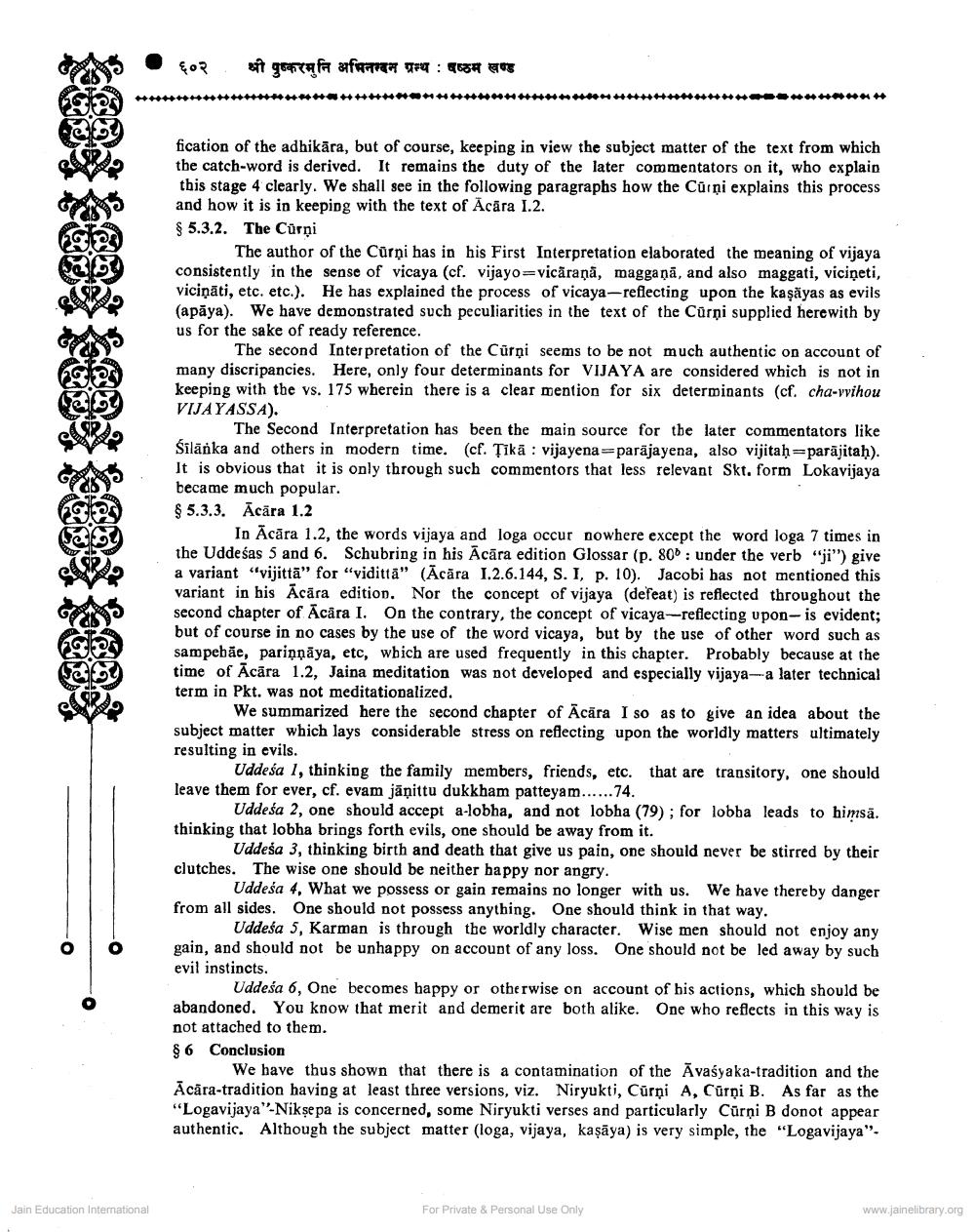Book Title: Logavijaya Niksepa and Lokavicaya Author(s): Bhatt Publisher: Z_Pushkarmuni_Abhinandan_Granth_012012.pdf View full book textPage 7
________________ -O O Jain Education International ६०२ श्री पुष्करमुनि अभिनन्दन ग्रन्थ : षष्ठम खण्ड **** fication of the adhikara, but of course, keeping in view the subject matter of the text from which the catch-word is derived. It remains the duty of the later commentators on it, who explain this stage 4 clearly. We shall see in the following paragraphs how the Curni explains this process and how it is in keeping with the text of Acara I.2. § 5.3.2. The Cūrņi The author of the Curni has in his First Interpretation elaborated the meaning of vijaya consistently in the sense of vicaya (cf. vijayo=vicāraṇā, maggaņā, and also maggati, vicineti, viciņāti, etc. etc.). He has explained the process of vicaya-reflecting upon the kaşayas as evils (apaya). We have demonstrated such peculiarities in the text of the Curni supplied herewith by us for the sake of ready reference. The second Interpretation of the Cūrņi seems to be not much authentic on account of many discripancies. Here, only four determinants for VIJAYA are considered which is not in keeping with the vs. 175 wherein there is a clear mention for six determinants (cf. cha-vvihou VIJAYASSA). The Second Interpretation has been the main source for the later commentators like Silänka and others in modern time. (cf. Tikā: vijayena paräjayena, also vijitaḥ=parajitaḥ). It is obvious that it is only through such commentors that less relevant Skt. form Lokavijaya became much popular. § 5.3.3. Acara 1.2 In Acara 1.2, the words vijaya and loga occur nowhere except the word loga 7 times in the Uddeśas 5 and 6. Schubring in his Acara edition Glossar (p. 80: under the verb "ji") give a variant "vijitta" for "viditta" (Acara I.2.6.144, S. I, p. 10). Jacobi has not mentioned this variant in his Acara edition. Nor the concept of vijaya (defeat) is reflected throughout the second chapter of Acara I. On the contrary, the concept of vicaya-reflecting upon- is evident; but of course in no cases by the use of the word vicaya, but by the use of other word such as sampehae, pariņņaya, etc, which are used frequently in this chapter. Probably because at the time of Acara 1.2, Jaina meditation was not developed and especially vijaya-a later technical term in Pkt. was not meditationalized. We summarized here the second chapter of Acara I so as to give an idea about the subject matter which lays considerable stress on reflecting upon the worldly matters ultimately resulting in evils. Uddeśa 1, thinking the family members, friends, etc. that are transitory, one should leave them for ever, cf. evam jāņittu dukkham patteyam......74. Uddeśa 2, one should accept a-lobha, and not lobha (79); for lobha leads to himsā. thinking that lobha brings forth evils, one should be away from it. Uddeša 3, thinking birth and death that give us pain, one should never be stirred by their clutches. The wise one should be neither happy nor angry. Uddeśa 4, What we possess or gain remains no longer with us. We have thereby danger from all sides. One should not possess anything. One should think in that way. Uddeśa 5, Karman is through the worldly character. Wise men should not enjoy any gain, and should not be unhappy on account of any loss. One should not be led away by such evil instincts. Uddeśa 6, One becomes happy or otherwise on account of his actions, which should be abandoned. You know that merit and demerit are both alike. One who reflects in this way is not attached to them. § 6 Conclusion We have thus shown that there is a contamination of the Avasyaka-tradition and the Acara-tradition having at least three versions, viz. Niryukti, Cürņi A, Curņi B. As far as the "Logavijaya"-Nikṣe pa is concerned, some Niryukti verses and particularly Curņi B donot appear authentic. Although the subject matter (loga, vijaya, kaṣāya) is very simple, the "Logavijaya" For Private & Personal Use Only www.jainelibrary.orgPage Navigation
1 ... 5 6 7 8 9 10
